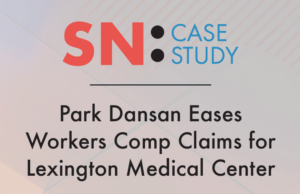
Solvent_CaseStudyLexington_19 (Park Dansan)
“Our fee is low, and is discounted even more for SCHA- affiliated hospitals. But if you write it off, you lose 100 percent of the revenue. Let us get you 90 or more percent instead. There’s no downside to having Park Dansan maximize your Workers Compensation recoveries.”
Dean Jenks, VP for Healthcare Services Park Dansan
Most companies wouldn’t stay in business very long if their employees routinely spent 25 percent of their time on tasks that generated only 2 percent of revenue. Or if they had to write off bad debts because the collection process was overly complicated and time-consuming. But that’s what hospitals often face in trying to collect reimbursements through Workers Compensation, the insurance program covering on-the-job incidents that require medical care.
South Carolina hospitals have a better option, thanks to Park Dansan, a Solvent Networks endorsed partner. Park Dansan specializes, and in fact is considered the industry leader, in Workers Compensation recovery.
Just ask Michael Womack, director of patient financial services at Lexington Medical Center. He believes Park Dansan saves them the equivalent of a full-time staff position by handling hard-to-collect claims so that staff can spend their time more productively.
“Workers comp claims generally account for a small volume of your inventory but a lot of time and effort for appropriate billing,” Womack said. His staff handles an average of nearly 2,200 managed care claims per month compared to only 91 Workers Compensation cases, but the latter can sometimes consume 25 percent of staff time.
“In the time that’s spent on those 91 claims, a staff member could complete three times the number of other claims and generate many times the return,” he said.
Workers Compensation claims are complicated for a number of reasons. They may involve litigation, or an employer may balk at paying until they can determine if the worker was somehow negligent. Different states and municipalities may have different pay schedules. The paperwork and time to resolution can be taxing.
In those cases, it makes sense to turn the claims over to experts at Park Dansan, especially if internal efforts to collect have stalled and claims appear headed for a write-off.
“Workers comp recovery is not rocket science, but it is very labor-intensive,” said Dean Jenks, vice president for healthcare services at Park Dansan. “Hospitals have a finite number of FTEs, and if they do add staff, it’s probably going to be in clinical positions, not administrative areas. That makes it important to direct existing employees to more streamlined and productive work. We can help by doing the labor-intensive work for them.”
Park Dansan started as a bad debt collections agency and has been in continuous business for 77 years. About 1 5 years ago, it evolved into a company focusing on healthcare services, mostly in Workers Compensation recovery but also specialty consulting services.
Womack says the partnership works well for LMC, a 438-bed hospital in West Columbia that anchors a healthcare network of five community medical centers and employs a staff of more than 6,500 professionals. Park Dansan’s systems and workflow are automated, information is readily available, and his personal spot checks on fee schedules tell him that they are “on the money.”
“Utilizing Park Dansan allows us to keep all internal hospital claims internal and outsource the more complicat-ed external issues after 90 days,” he said. “It has worked very well for us.”
Jenks is equally complimentary of Lexington’s staff. “Mike has skilled folks in his shop, and they do a good job at collecting. But he recognizes that there’s a point where they’re not making the best use of their time, and that’s when he turns it over to us.”
Jenks says Park Dansan uses a secure web portal that integrates easily with a hospital’s system, so there’s no need to install new software or retrain staff. And there’s no long-term contractual obligation. He urges South Carolina hospitals to take one final step before writing off a Workers Compensation claim: Call Park Dansan. As a member of Solvent Networks, they offer discounted rates for South Carolina hospitals for their services.
“Our fee is low, and is discounted even more for SCHA- affiliated hospitals. But if you write it off, you lose 100 percent of the revenue. Let us get you 90 or more percent instead. There’s no downside to having Park Dansan maximize your Workers Compensation recoveries,” he said.
“In today’s healthcare environment, hospitals have to maximize existing revenue just to stay in business, let alone grow. Workers comp is an often-overlooked source of revenue because it’s a small percentage of the volume. But it’s a profitable payer. In South Carolina, the average Workers Compensation claim pays the Medicare rate plus 40 percent. We’re passionate about helping hospitals recover the funds that they have earned so that they can keep providing care to their communities. That’s why we do what we do.”
Park Dansan is a member of Solvent Networks, a division of SCHA that endorses partners that offer programs, products or services that can be immediately deployed in healthcare facilities to solve workforce, financial and operational issues and challenges. Solvent Networks identifies, vets and negotiates contracts with endorsed partners to provide services for state hospitals at the best possible price.
“The Solvent Networks seal of approval assures hospitals that our endorsed partners meet the highest standards for quality, customer service and value,” said Neill Cameron, President.
RETURN to related Pain Points Newsletter
